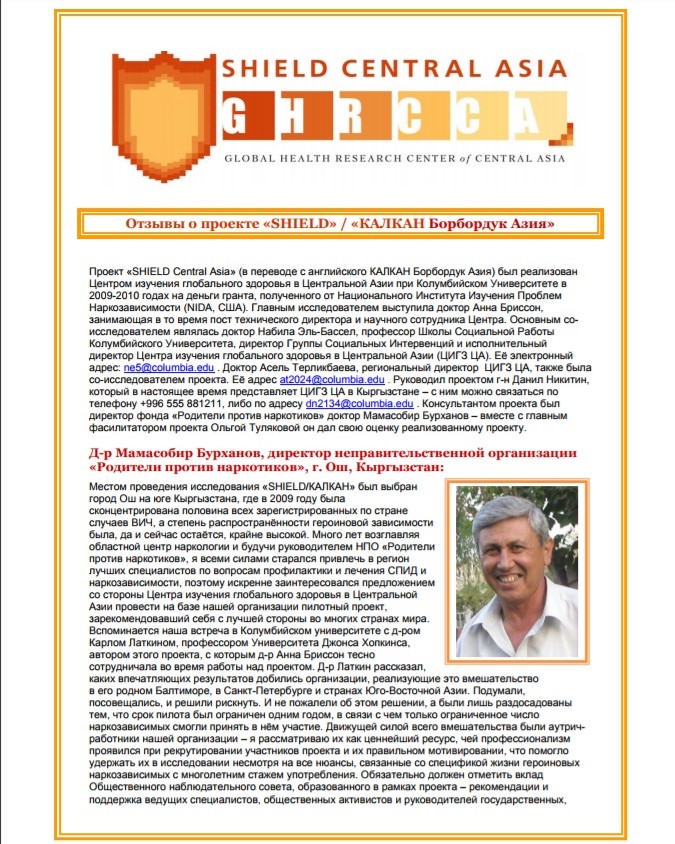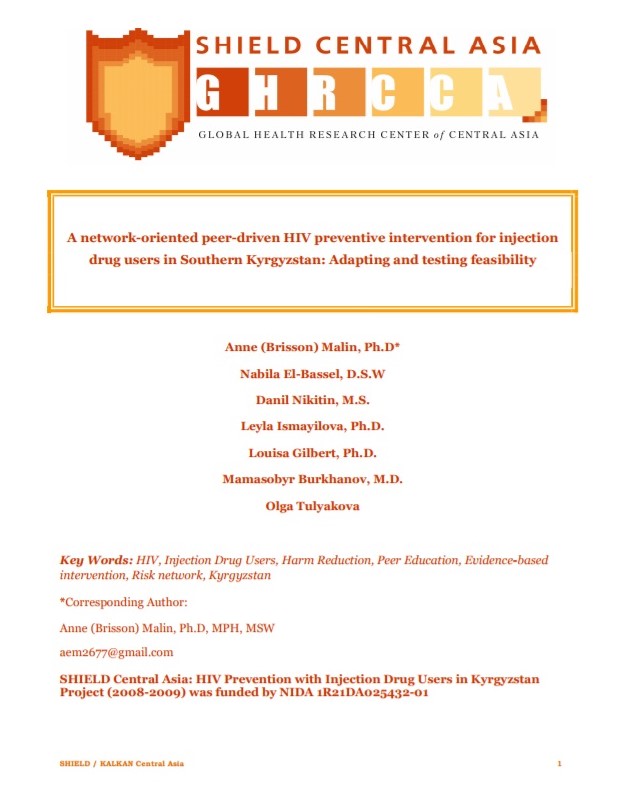 The “SHIELD – Central Asia” Project is an effort through which the Global Research Institute (GLORI) Foundation together with colleagues at Columbia University empowers collaboration between US investigators and Kyrgyz scientists to conduct exploratory/developmental research related to HIV/AIDS and drug abuse. The GLORI aims to develop and scale up sustainable, effective solutions to pressing global health problems and to reduce health disparities in Central Asia. This project provides an important opportunity for strengthening the partnership and building research capacity in Central Asia. It was funded by National Institute of Health’s, National Institute of Drug Abuse (NIDA), and the official project number is 1 R21 DA 025432-01.
The “SHIELD – Central Asia” Project is an effort through which the Global Research Institute (GLORI) Foundation together with colleagues at Columbia University empowers collaboration between US investigators and Kyrgyz scientists to conduct exploratory/developmental research related to HIV/AIDS and drug abuse. The GLORI aims to develop and scale up sustainable, effective solutions to pressing global health problems and to reduce health disparities in Central Asia. This project provides an important opportunity for strengthening the partnership and building research capacity in Central Asia. It was funded by National Institute of Health’s, National Institute of Drug Abuse (NIDA), and the official project number is 1 R21 DA 025432-01.
Background
Central Asia is experiencing one of the fastest growing HIV epidemics in the world, the emerging epidemic is injection drug-associated and the region is identified as highly vulnerable for an HIV/AIDS crisis. Rates of HIV continue to increase among IDUs and there is a critical need to implement innovative targeted culturally- and contextually-congruent HIV behavioral prevention interventions. The “SHIELD – Central Asia” study was conducted in the southern city of Osh, where half of all the known HIV cases in Kyrgyzstan reside. IDUs’ access to public health clinics and substance abuse prevention and treatment is limited, and it is estimated that less than half of them in Osh are receiving any information about HIV or accessing free syringes and condoms.
Study Goal
In the project, we focused in adapting the Self-Help in Eliminating Life-threatening Diseases HIV SHIELD prevention intervention to the circumstance in Central Asia, testing its feasibility and safety, and examining its preliminary effects. The intervention is a small group, manualized network-oriented peer education program for the prevention of HIV transmission among IDUs and their network members. The SHIELD intervention is a best-evidence intervention and has been rigorously evaluated and shown significant effects in reducing sexual and drug risk behaviors among IDUs and their risk networks. It can be sustained in a low resources setting, it addresses both the drug and sexual HIV transmission routes, and has an ability to reach IDUs who are not connected to current prevention programs.
Study Activities
To inform the adaptation of the intervention, the GLORI Foundation team used qualitative research methods (focus groups) to refine the intervention and then piloted the adapted version for feasibility and preliminary outcomes. The project had been lasting from September 2008 through September 2009. We conducted focus groups with 12 injection drug users and separately with a newly formed Community Advisory Board. The information was used to refine the intervention to the Kyrgyzstani culture and context in Osh. The revised intervention was piloted for feasibility and potential promise with 60 participants (30 index participants and 30 network members) using a pre-post design. Assessment was conducted at baseline, immediate post intervention (IPI), and 1-month post intervention. The information was used to inform the advanced and bigger study to test the efficacy of the intervention through a randomized clinical trial (RCT) with a large sample size.
Conceptual Framework Guiding the Intervention
The intervention is a cognitive behavior and social influence peer education training program consisting of theory-based exercises and activities and outreach training. Behavior change is targeted at the individual injection drug user level and also at the group norm level. The intervention addresses knowledge, attitudes, and social influences aimed at reducing sex and drug risk practices among the participants and their network members. The intervention also includes outreach training, which facilitates communication between the index participant and network members. The primary theories guiding the intervention are Social Cognitive and Social Influence Theory.
Social Cognitive Theory explains behavior in terms of a triadic reciprocity in which behavioral, cognitive, and other personal factors (including self-efficacy and knowledge) and environmental factors (including social norms and social support) all operate as interacting determinants. Social Influence Theory is used as the processes involved can have powerful effects on behavior and present an important avenue for HIV prevention.
The intervention was implemented through a social network model, enabling the intervention to reach an IDU and their personal risk network members. The intervention targets an index participant and trains the participant to be a peer educator among his social network, introducing safer sexual behaviors and injection practices, including information on where to access cookers, alcohol, cotton swabs, and bleach kits. The underlying theories guiding the intervention informed the selection of the assessment measures.
SHIELD Research Team
A joint US-Central Asian research team implemented this project. The Principal Investigator was Dr. Anne Brisson, who at that time was an Associate Research Scientist and Director of Operations for the Columbia University Global Health Center in Central Asia.
The lead Co-investigator was Dr. Nabila El-Bassel, a Professor at the Columbia University School of Social Work (CUSSW), Director of the CUSSW Social Intervention Group (SIG) and Executive Director of the Columbia University Global Health Research Center of Central Asia (GHRC). Dr. Assel Terlikbayeva, the GHRC Regional Director, was also the co-investigator with the project. The project director was Mr. Danil Nikitin, and Dr Mamasobyr Burkhanov, the Director for the Osh-based Parents Against Drugs Foundation, was a consultant on the project.
Download English version of a 2-page SHIELD Project summary report, with key implementers’ feedback:




















